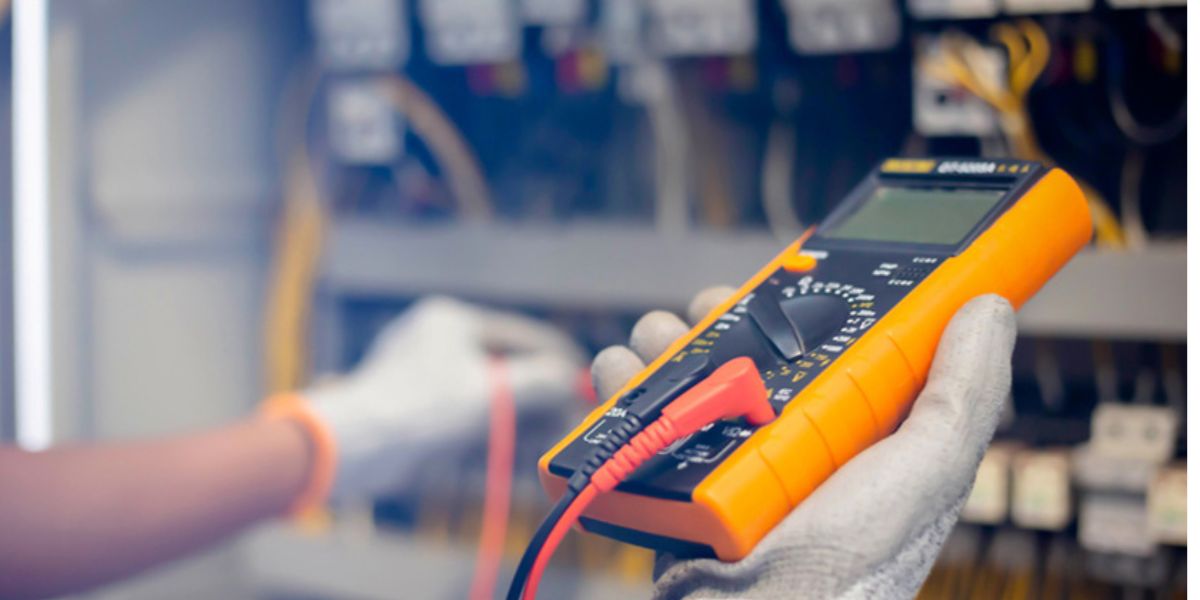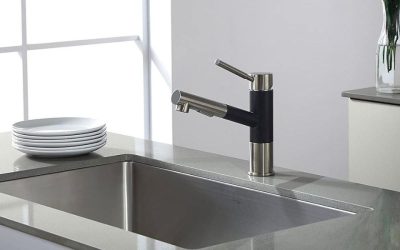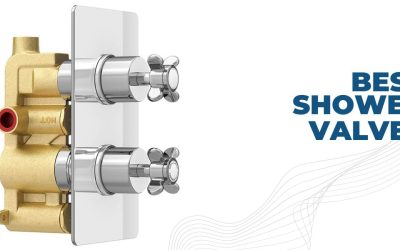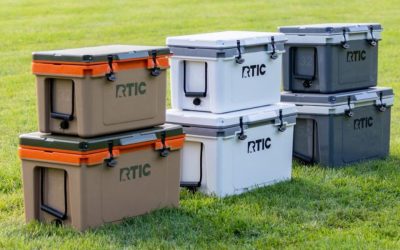Say, you’re driving on the highway, and you see the siren of a police car buzzing toward you. What is the first thing you check? Your speedometer, correct? It’s the same with our electronics, but here, we use a multimeter.
If you notice anything unusual, either you check it or call the professional to do it for you. Either way, you or the electric technicians need the best digital multimeters to get a correct reading.
Hence, having a multimeter is a must for electricians, and if you are one, then you know there are loads of options. Well, as you came to this article, it seems we can be of help. Have a look at the reviews down below.
Top 10 Multimeters Review – Best Digital Multimeters to Buy in 2023
With so many options in front of you, which one are you going to select? It’s hard to decide if you don’t know which one comes out on top. This short comparison chart and then the reviews will help you decide.
In this part of the article, we’ve gone over our recommended 10 multimeters for electricians, their features, and the pros & cons a potential buyer should keep in mind. Let’s get down to it.
1. Fluke 117/323 Multimeter Combo Kit
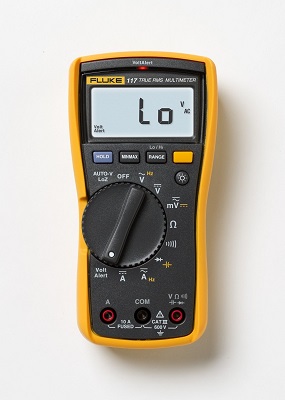
Latest Price On
Our list starts with none other than The Fluke brand’s multimeters. That’s right; in this package, you’re getting not one but two fluke devices. They are the Fluke 117 and 323 multimeters. If you ask around, you’ll see Fluke is almost top choice for electricians.
We won’t go into the usual details about multimeters. These multimeters are just like any other but the best at doing the job. Both the 117 and 323 measure AC amp, AC/DC voltage, and resistance. But the 323 doesn’t measure DC amp, meaning you can’t use it on any battery-powered devices.
The 117 isn’t a clamp meter while the 323 is but both of them are excellent in terms of reading accuracy with the 117 being the most accurate among all the products on this list. For a first-time user, 323 clamp meter is the best multimeter for the money even though they are both pretty user-friendly.
In terms of safety rating, both of them have a 600V CAT III certification, with the 323 having an extra 300V CAT IV rating.
It’s understandable why they are deemed user-friendly. It gets even better due to the compact and ergonomic design of these multimeters. Moreover, the 323 is a non-contact multimeter.
You may want a multimeter to do more like measuring capacitance, temperature, etc, units, but for most electricians, this combo from Fluke is more than enough. And their TRMS measurement method is truly top-class.
Pros
- Ergonomic design
- Automatic ranging
- TRMS measurement
- High reading accuracy
-
Safety rating for CAT III and CAT IV
Cons
- NO thermocouple
-
323 doesn’t measure DC
2. Fluke 115 Compact True-RMS Digital Multimeter
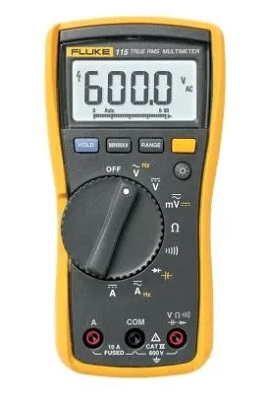
Latest Price On
Here’s another Fluke product on this list, and it’s not the last. But it’s not about partisanship. Fluke does make quality products that just take over the top spots. This Fluke 115 is pretty similar to the Fluke 117 that we mentioned at the very first.
Moreover, it can read the usual things like DC/AC voltage (600V), DC/AC (10A), resistance up to 40MΩ, capacitance up to 1000µF, and 50kHz of frequency. It also can check for continuity and diode as opposed to the fluke 115 and 323. So that makes it more versatile.
With the auto-ranging feature, measuring the units is faster and easier. In terms of accuracy, it’s almost perfect even for the non-linear load thanks to the measurement method, the True RMS (root mean square).
As for safety rating, it has a 600V CAT III certification, so it’s good enough to be used in housing electric circuits without any risk of short circuits. But as it’s not a clamp meter, you have to go in direct contact with the copper wire. Be careful not to misplace the probes.
The build quality of this thing is good enough to last you years. Simple falls on concretes only scratch the surface but don’t go trying to test it out! But it won’t fall out of your hand as it’s ergonomic and small enough to stay safe in your hands.
With a backlit display and hold, Min/Max buttons, it gets green light for ease of use. Any inexperienced user will be able to work with it with simple instructions. And we all know the saying, great products are easy to use. Too many praises? Well, it deserves them.
Pros
- Ease of use
- Good design
- Auto-ranging
- CAT III 600V rating
-
TRMS measurement
Cons
- Expensive
3. INNOVA 3320 Auto-Ranging Digital Multimeter
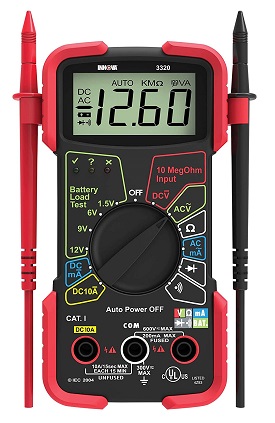
Latest Price On
Innova is a mid-tier company, and they have to produce some of the most reliable and affordable devices on the market. This multimeter is as capable as the big, expensive multimeters but with a price reduction. But of course, there are some limitations to it.
In terms of measuring units, it measures AC/DC voltage, resistance, continuity, and DC amps. With regards to AC amps, they can only measure in milliamps, and that’s the limitation. But it’s great at measuring DC amps, which is why its main selling point is as a Battery Tester. It’s famous among automation workers.
It can also test diodes, making it one of the most versatile multimeters for the money. Another key point of this multimeter is the auto-ranging capability, although you’ll need to select the ranges for each of the measurements. For resistance, it can test up to 20MΩ and DC amps up to 10A.
From the aspect of design and build quality, the Innova 3320 multimeter is lightweight, which means it’s not as robust as higher-priced multimeters. But it’s not a hammer, so it’s fine as long as you’re careful. Along with having an ergonomic design, it also has a rear strap for easy holding.
It has a good display for viewing purposes, but it’s not backlit, so it can be hard to see in lowly lighted areas. In terms of safety, it only has a CAT II safety rating. So it won’t be appropriate for testing electrical circuits.
The multimeter is most suited to DIY people and those who work with battery-powered electronics, but not for professionals. Even with the AC amp limitation, the affordability and versatility make it the best multimeter for the electronics hobbyist.
Pros
- Cheap
- Versatile
- Auto-ranging
- Good accuracy
- Lightweight and easy to use
-
Can be used for battery testing
Cons
- Only rated for CAT II safety
4. Fluke 87-V Digital Multimeter
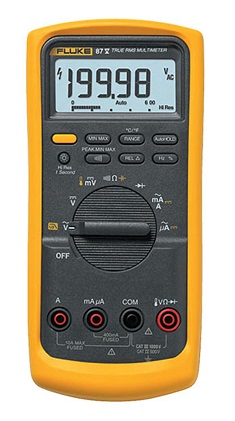
Latest Price On
It may have the name fluke, but the multimeters it produces aren’t flukes by any means. If you haven’t been impressed with Fluke’s multimeters, then this one will. First of all, this is an expensive multimeter, the most expensive on this list. Is the price justified? Well, you are the judge of that.
In terms of measuring different units, this 87-V multimeter can measure AC/DC voltage (1000V) and current (10A), capacitance (10,000µF), and resistance, and check for continuity as well as diode testing. As you can see, this multimeter has it all. All of the measurements are taken through the True RMS method.
Additionally, it also has a thermometer probe to check for temperature input which is missing in other multimeters in its class. The display can deliver both 6000 and 20000 counts, and it’s a large backlit display. And it has an analog bar graph display as well.
It has the usual buttons and functions that we need not mention. This 87-V also comes with Fluke’s Twistguard double-insulated test lead set, which is another great product on its own.
As for design and build quality, this particular Fluke has 1000C CAT III and 600V CAT IV ratings. That is some safety assurance. And the overall design of it is robust and ergonomic to make the experience better and safer.
It’s a highly-priced multimeter for sure, but you’re also getting a lot of features and quality. It may well be the best multimeter for electricians.
Pros
- Low-pass filter
- Thermometer probe
- CAT III and IV rating
-
Dual resolution display
-
Comes with a Fluke Twistguard lead set
Cons
- Highly expensive
5. Etekcity MSR-R500 Digital Multimeter
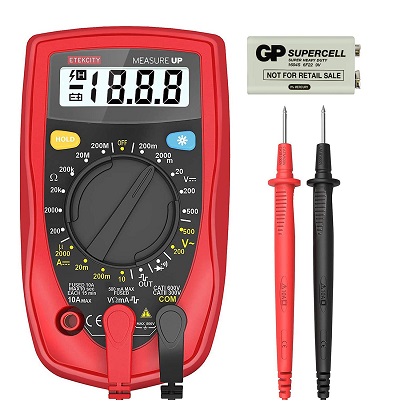
Latest Price On
If you’re looking for an even cheaper multimeter than the Innova 3320, then this MSR-R500 from Etekcity is a great option with similar features, albeit with some downsides. Before going any further, you should know that nothing about this product is going to blow your mind, except its low price point.
As a multimeter, it can check for AC & DC voltage, diode, continuity, resistance, and DC ampere. It cannot check for AC; keep that in mind. That’s the main downside. But those it can measure, it measures quite perfectly.
The resistance meter can read a maximum of 20MΩ and an AC/DC voltage of 500V with 3 scans per second. And it has a continuity buzzer. As for safety rating, it’s not shocking that it has CAT II (300V) and CAT I (600V) ratings. So it’s recommended to not use it on electrical circuits aka AC.
It’s very easy to use thanks to the Data hold button; you can hold a single reading with it. The large LCD panel is backlit, and it’s a bonus at this price. You can check for readings even in dimly lit places. And also, has a stand attached to the multimeter for hands-free use.
With an ergonomic design, it feels comfortable to hand, and it’s light as well. Other than that, it has some safety measures built into it, such as overload protection and a protective rubber sleeve all around the multimeter.
If it had the auto-ranging feature, it would have been great, but for this price, can you complain? Not really. As it’s evident from the features, it’s a good fit for people who deal in electronics run by DC power.
Pros
- Cheap
- Lightweight
- Backlit display
- Data hold button
-
Continuity buzzer
Cons
- It doesn’t have auto-ranging feature
6. Klein Tools MM400 Multimeter
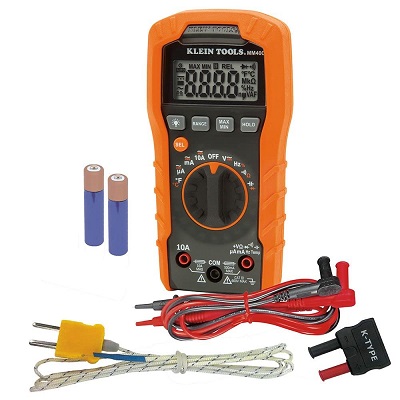
Latest Price On
Klein doesn’t need any introduction to electric technicians and DIY enthusiasts. It’s one of the best out there and has many offerings for all price ranges. This MM400 model is one of the cheaper ones offered by Klein. With all the basic functions for average users, it has a good build quality.
It can measure DC/AC voltage (600V), Ampere DC/AC (10A), 40M resistance, and temperature input as well. And all of the measurement is done through the RMS (not TRMS) method and the accuracy of it is known to all.
With regard to continuity and capacitance, the performance isn’t that good. And that’s a given at this price. You’re getting a CAT III 600V safety rating for it, that’s more than you’d hope for. Moreover, the fuses on the board are made of ceramic.
As for button functions, you’re getting max/min value, data hold, and a range button. Other functions are there, too, such as the auto-shutoff to save battery. And these batteries are AAA batteries that are easy to get.
The display on this Klein multimeter is a backlit panel with a good enough resolution. And Klein made it compact with a rugged body just like all other Klein products. It can handle a bit of unintentional abuse.
Pros
- Affordable
- Auto-ranging
- Thermocouple
- CAT III 600V rating
-
Compact and rugged build
Cons
- Not TRMS
7. Etekcity MSR-C600 Digital Multimeter
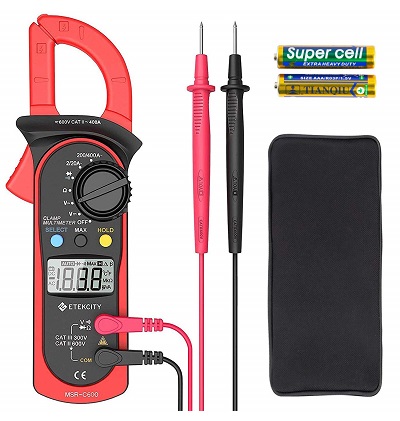
Latest Price On
At number 7, we have another Etekcity multimeter for electricians to look at. It’s a bit higher priced than the MSR-R500 we mentioned earlier, and it’s justified in our opinion. Why? Well, because it has some features that the previous model lacks.
For starters, it can work with AC as opposed to the MSR-R500. But it also loses the ability to work with DC, which the R500 had. So there’s some give and take. But that’s not all; this multimeter doesn’t work with probes rather, it utilizes the clamping technique where you don’t have to go in direct contact.
The clamp works up to a 26mm thick conductor without disrupting the circuit. As for other testing abilities, it can check for resistance up to 20MΩ, and DC/AC voltage up to 600V. It also checks for continuity with a buzzer and boasts a diode checker as well.
It also has a 300V CAT III and a 600V CAT II rating, and for this price, this is great news. To save battery, it has a sleep mode that gets activated automatically after 15 minutes.
Another point of benefit over the lower-priced Etekcity multimeter is that this one has the auto-ranging feature to help you find the reading faster and with more accuracy. That being said, you will need to help the multimeter to find out the range.
There are some other useful features, such as the result hold and max value buttons. For ease of use, the display module on this multimeter is a large LCD panel, but it’s not backlit. And the ergonomic shape of the multimeter is self-evident.
Pros
- Cheap
- Sleep mode
- Clamp meter
- Auto-ranging
- 300V CAT III rating
Cons
- Can’t measure DC
-
Non-backlit panel
8. EEVblog Brymen BM235 Multimeter
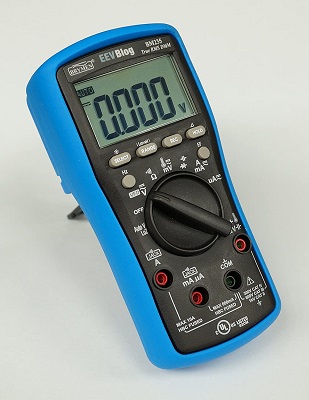
Latest Price On
At number 8, we have the BM235 multimeter from EEVblog Brymen. This is a mid-tier multimeter with a few very high-quality features similar to higher-priced multimeters. An affordable but feature-packed multimeter is what you’re looking for.
It can measure AC/DC voltage (1000V), current (10A), and resistance (60MΩ) as well as check for continuity, and test diode. Unlike most of the similarly priced products, this one has a thermocouple to measure temperature. It utilizes the TRMS method.
But that’s not all! You’re getting 600V CAT III and 300V CAT IV safety ratings to make sure you’re safe from harm. How did Brymen manage all that and still keep the price low? We have no idea. Furthermore, Brymen ensured that the multimeter feels good in the hand and lasts for a long time.
The display on this device has a 6000 count and a fast refresh rate. Readability is good, thanks to the backlit panel. This backlit panel flashes to show continuity, but there’s no bar graph on the screen. But it’s nothing to fuss about really.
As for functions, it has the usual features like min, max, data hold, etc. But there’s no off position at the beginning and end of the dial arc. That is something to keep a note of.
The AAA batteries are a treat to the eyes as the 9V batteries in other multimeters are hard to find. These AA batteries last long enough. With a low-impedance mode, this is the best budget option for you.
Pros
- Affordable
- Sharp display
- Auto-ranging
- CAT III and IV rating
- Low-impedance mode
-
Temperature measurement
Cons
- There’s no bar graph
-
Lacks off position at the beginning and end of the dial arc
9. Klein Tools MM600 HVAC Multimeter
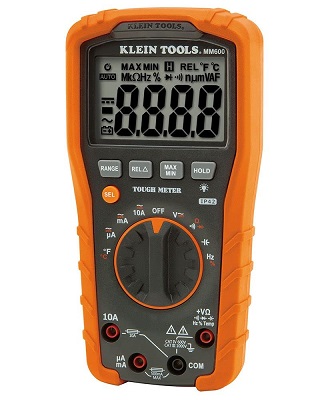
Latest Price On
Klein doesn’t shy away from making some absolute units even if it’s priced low. And this 69149 Klein tool is proof of that. With all the basic features and good build quality, this is certainly a multimeter to consider.
The device can measure DC/AC voltage but only DC. So that’s a sacrifice you have to make at this price. It can also measure resistance, check for continuity, and that’s about it. The good news is that it has auto-ranging ability, which is a big plus at this price.
This Klein model incorporates a digital power button and an automatic shut-off function to save the battery. You’re getting min/max or data hold buttons. As for the display, it’s not backlit and small in size, which makes it harder to read in dark places.
Even though it’s a low-priced multimeter, it has a 600V CAT III rating, which makes it suitable for moderate industrial work but limited to DC currents only. The build quality is good for its price but not great either as it’s a lightweight product. It can survive a 3.3-foot drop.
For DIY guys and homeowners, this is a great easy-to-use product. Professionals will have to look at more advanced options from Klein.
Pros
- Affordable
- Auto-ranging
- Auto shut-off
- 600V CAT III rating
-
Compact and lightweight
Cons
- Small, non-backlit display
10. Extech EX330 Autoranging Multimeter
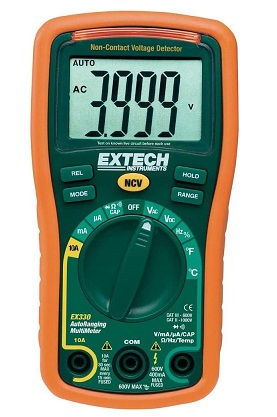
Latest Price On
The last product on this list is the EX330 from Extech. Don’t let the position fool you. This affordable yet feature-packed multimeter competes with the big boys in the market. There are so many things it has going for it.
For starters, it can measure everything a Fluke 117 can do. That includes DC/AC (10A), voltage (600V), resistance (40MΩ), capacitance, and temperature input as well. Even the Fluke 117 doesn’t have a thermocouple. You also can detect voltage without direct contact.
The design and build quality of this multimeter are that of the expensive ones. It’s well-built with a solid grip around it. You’ll notice that the battery/fuse can be accessed separately, and that’s a brilliant design. It’s rare to have it in such an inexpensive unit.
As for functions, it has an auto-shutoff feature to save battery. And a data hold button for ease. In terms of readability, the display is large, and it’s a 4000-count display although there’s no backlit.
And yes, there’s auto-ranging in the multimeter, although it doesn’t utilize the TRMS method. Concerning safety issues, it has a 600V CAT III and 1000V CAT II safety rating. For this price, it’s more than enough. It can fulfill any residential need.
Pros
- Affordable
- Auto-ranging
- Auto-shutoff feature
- Temperature measurement
- 600V CAT III safety rating
-
Solid build quality and design
Cons
- No TRMS method
Things to Consider Before Choosing Digital Multimeter
Multimeters can be complex to understand if you’re new to the subject. There are some important features that all good multimeters should incorporate in them. Only then they’d be worthwhile. Here we’ll briefly discuss them but in laymen’s terms.
Safety Rating: Whenever you work with electronics and electricity, the first point is about ensuring safety. And when testing AC cycles, multimeters operate by connecting with the bare wire through probes.
So, to make sure you and your devices are safe, multimeters need to be certified to handle certain types of loads. And to do that, there are some ratings such as CAT. There are 4 categories of CAT rating.
- CAT I
- CAT II
- CAT III
- CAT IV
The first two categories are taken as the weakest category as they cannot take much power, and most of them can’t work with AC. Then, in the CAT III category, there are different divisions depending on voltage.
The divisions are 300V, 600V, 1000V, etc. And the same is with the CAT IV category, and this category is the highest level of safety.
There are other certifications regarding electric safety standards such as IEC, International Electrotechnical Commission.
Measurement Accuracy and Readability: Getting an accurate reading and being able to read the reading is vital. A good backlit panel will suffice for that. And the most accurate measurement method is the True RMS method. What’s True RMS?
RMS vs TRMS: RMS = Root Mean Squared is a method of measuring the average value of AC/DC cycles. Multimeters take the peak value from multiple readings and multiply it by a reduction factor to get an average value.
For currents, it’s a sine wave. This is called the Root Mean Squared method.
Whereas in the modern True RMS method, the multimeter takes multiple measurements in the AC cycle and averages them in a geometric mean formula to get an average value. This gives a more accurate final reading.
Clamp Meter: Clamp multimeters can be lifesavers both metaphorically and literally. With this type of multimeter, you can measure and read all basic readings without having to come in contact with naked wires because there is no need for a strip plastic coating on the wire.
Just clamp the wire, and it’ll give you reading. It’s such a nice feature for all beginners.
Low Z vs High Z: Impedance(Z) is like resistance, but it also considers the capacitance and inductance of the circuit. It’s a measure of opposition to the current circuit.
Having a low Z or low impedance in a multimeter is important to avoid ghost voltages messing up the reading. Ghost voltages are created by induction from surrounding power sources, which can show an effect so much that a wire without a current will show a voltage reading.
So, for a more accurate reading, you need Low Z in multimeters, and the Fluke 117 proved to be the best Low-Z multimeter.
Auto-Ranging: Finding the current reading of any measurement can be tough when you have to manually select the range of measurement. It takes a lot of trial and error, whereas if the multimeter has the automatic ranging capability, it can find out the range automatically. And that makes the process faster and easier.
Other Features: The features above are the must-have features that all multimeters should have. But there are features like continuity and diode check, capacitance, and temperature measurement that can come in handy.
Frequently Asked Questions (FAQ’s)
Can a multimeter cause a short?
In general, a multimeter won’t cause short circuits as it’s built to check for irregularities. A Short-circuit may happen if you somehow connect the probes or the probes slip and touch another component in the device.
What is the least count of a multimeter?
There is no single least count for multimeters. The least count depends on the multimeter’s capacity to display digits. If it’s a 3½ digit multimeter, then the least count is 0.001V, whereas, in a 4½ digit multimeter, it’s 0.0001V.
How much should I spend on a multimeter?
It depends on your job requirements. For any amateur-level work, you can do away with multimeters under $30. And for general maintenance work, any multimeter under $80 will suffice. However, for more advanced work, you will need to go higher, taking you up to even $200.
What is the easiest multimeter to use?
All the great products are easy to use. Clamp multimeters are the safer and easier option, thanks to the non-contact measurement method. The Fluke 323 is a top contender in this category.
What is the best cheap multimeter?
There are a few potential winners in this category. Both Etekcity and Fluke have some offerings, but either Etekcity’s MSR-C500 or MSR-R500 is the best cheap multimeter.
What is a good quality multimeter?
That’s a hard question to answer. All of the products on the list above are good-quality multimeters. If we were to grant only one, then it’d be the Fluke 115 multimeter. It’s expensive, but it has good features and robust build quality.
Which brand of multimeter is best?
Among the top brands in the market, we’d say multimeters from Fluke have been performing better than others. Klein’s multimeters come close.
Final Words
To conclude, each of the products in our recommendation list deserves to be among the best multimeters.
Take them into consideration and decide, depending on your budget. Our favorite multimeter is the Fluke 117 multimeter, but the top pick is the expensive Fluke 87-V.

